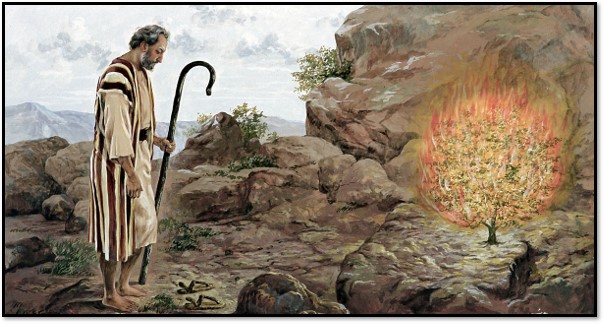
“And when the Lord saw that he turned aside to see, God called unto him out of the midst of the bush, and said, Moses, Moses. And he said, Here am I. And he said, Draw not nigh hither: put off thy shoes from off thy feet, for the place whereon thou standest is holy ground.” ~ Exodus 3:4-5.
Recordings 235A and 235B were posted through March 19. They are no longer available on this site. If you subscribe to the Joel Goldsmith Streaming Service, you can listen to them there. To purchase the recording or transcript for 235A, click/tap here. To purchase the recording or transcript for 235B, click/tap here.
To view or download the Optional Study and Practice Suggestions, click/tap here.
Our study book, I Stand on Holy Ground, is the collection of the 1976 Infinite Way Monthly Letters. Joel treasured the Monthly Letter as a fresh outline of study and practice for students each month. Once he said that if he had to give up all Infinite Way activities but one, the one he would keep was the Monthly Letter. But he emphasized that the Letter is only of value when we take what is in it and practice it; apply it in our daily lives. As a Monthly Letter, Chapter 6 is true to form. It is replete with instruction for study and practice, derived from two of Joel’s class sessions.
Listen to the Second Recording for This Chapter
In our online meetings, we heard the first recording that was used for this chapter, #235A. To get the fullness of the message that is given in Chapter 6, we highly recommend that you hear recording 235B, which is a continuation of 235A. It is an excellent lesson, in which Joel elaborates on several points in the chapter, giving more illustrations and insights.
Take Stock of What You Have Learned
In these classes, Joel counsels us – yet again – that the degree of our study and practice will determine our degree of illumination. So once you have studied the chapter and listened to both recordings, you may want to take stock of what you have absorbed from them. Joel refers to this process as “picking out the pearls.”
There are many ways to do this. One that might appeal to you is to see if you can answer the following questions, which are based on the chapter and the recordings, and which touch on many of the key points. In answering them, you may find that related ideas come to you that did not appear in the book or the recordings. That’s wonderful; include those ideas in your answers.
Of course, in doing an exercise such as this, we recognize that it is just another study tool to help us learn and practice the correct letter of truth. Being able to answer questions is not the same as having a developed consciousness, but it can be helpful as a way to develop that consciousness.
If you would like to see examples of some possible answers to these questions, click/tap here. But before you look, try to answer the questions yourself.
Goldsmith Global – Joel Goldsmith Infinite Way
Copyright © 2025 | ACS Quantum Design
